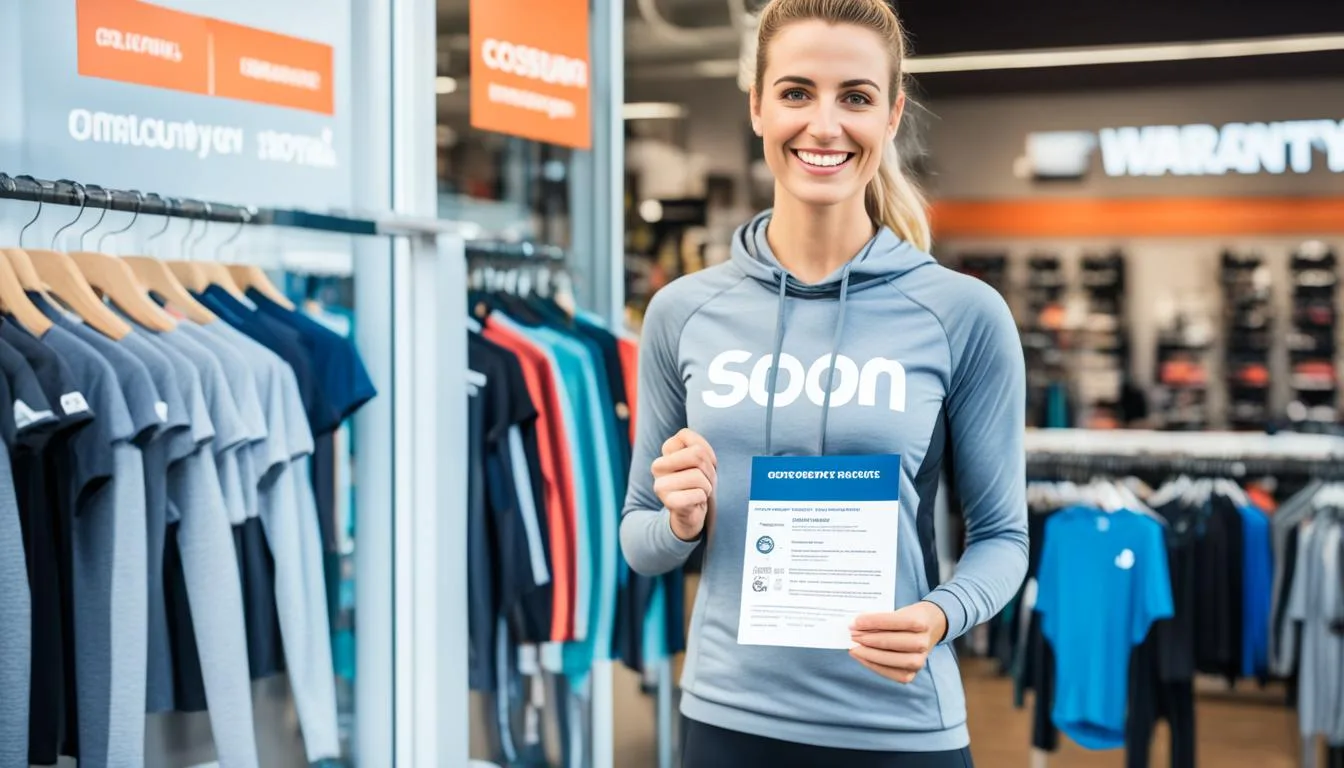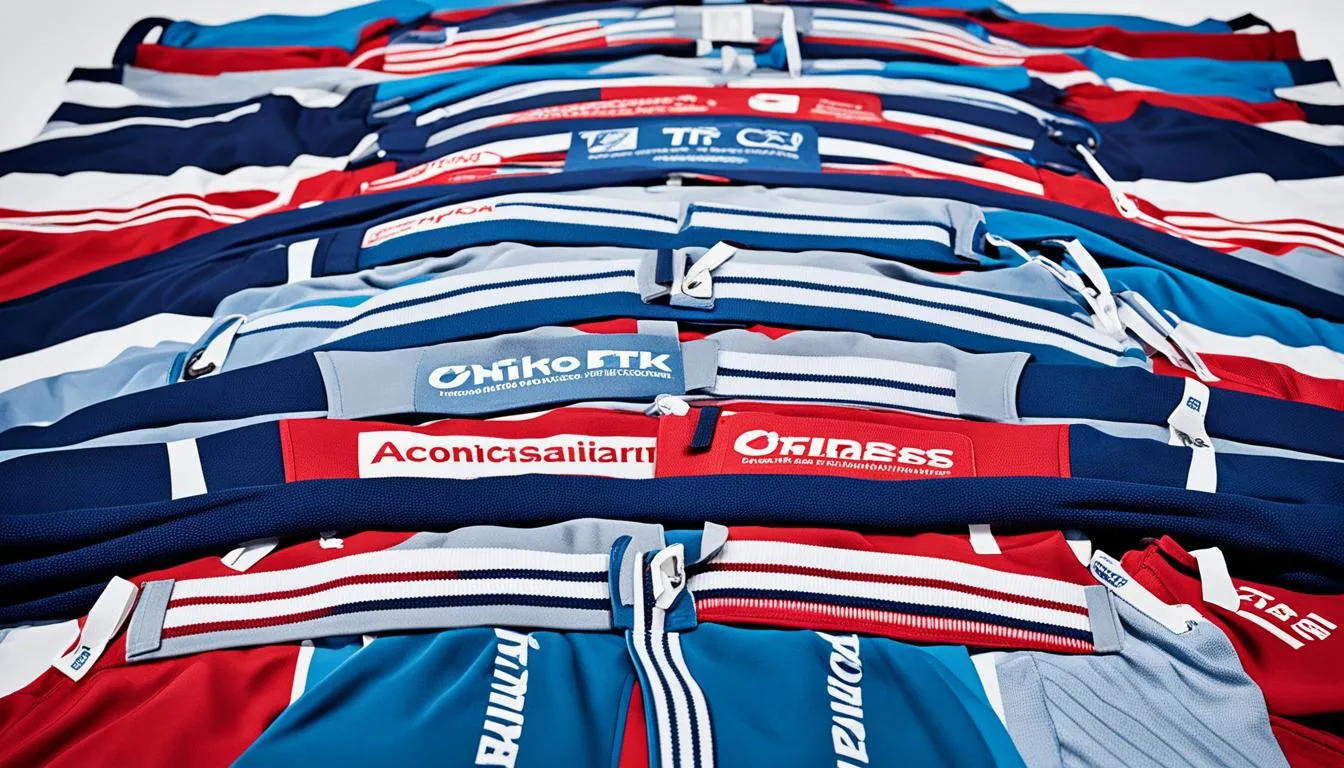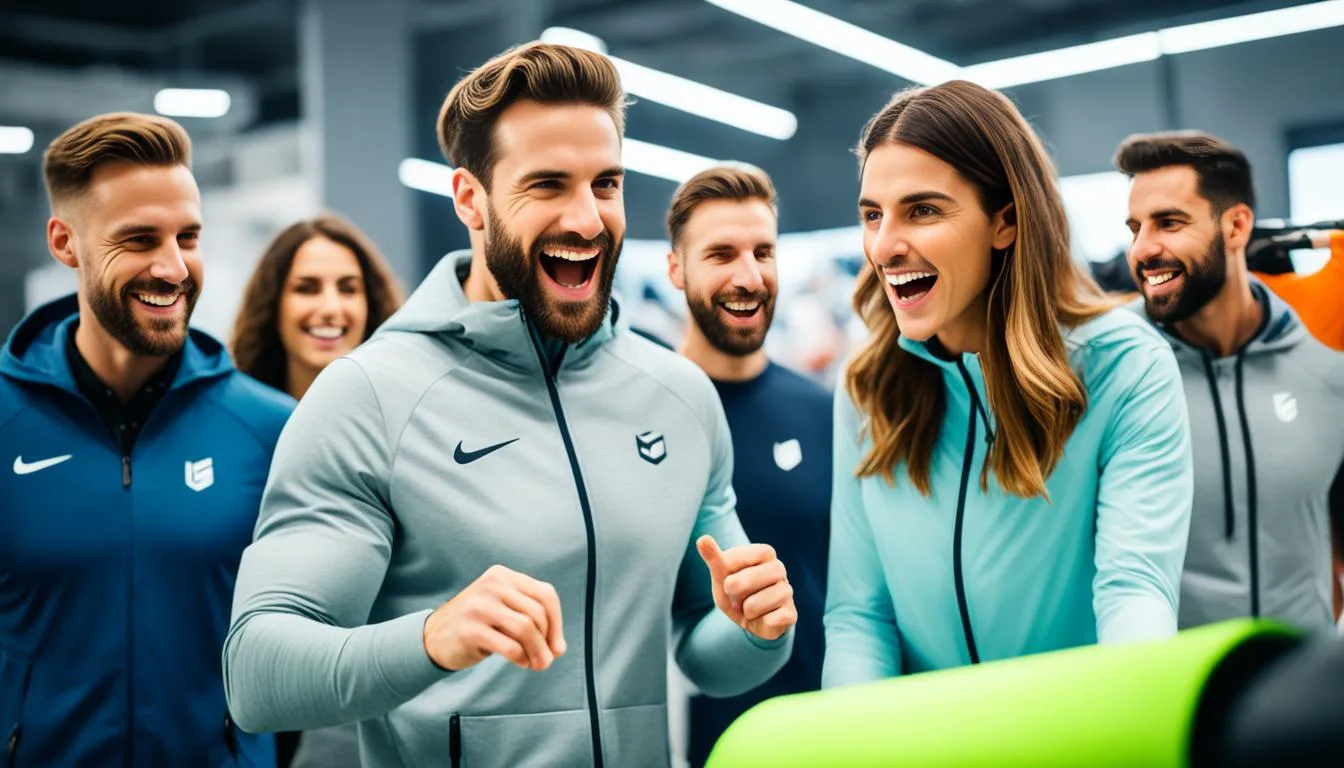How Sportswear Brands Use Fashion Shows to Showcase Innovation
Connect With Us Today
Consider us for your next production run. Why wait? Send us your questions here.
The global fashion industry is a giant that ties high and mass fashion together. It has masterfully blended style with function in sportswear1. Sportswear fashion shows lead this blend, showcasing and celebrating new ideas. These events mix beauty with tech, creating a spectacle admired across the sportswear sector1. At these shows, the commitment to innovating sportswear is clear. Craftsmanship and top performance meet, proving the sector’s push for better gear1.
Sportswear events have evolved beyond simple catwalks. They now include tech like virtual reality, making shopping futuristic and wide-reaching2. Innovation at these shows means a journey into the future of clothes. Digital runways on Twitch engage communities with compelling stories2. This new era reaches beyond the elite, affecting all parts of fashion. A dress can go from design in Milan to sale in Manhattan, showing how globalized and intricate the fashion world is1.
Key Takeaways
- Sportswear fashion shows are merging high fashion with high function, spotlighting the evolution within the industry1.
- Technological integration in fashion shows, such as VR and live streaming, is enhancing consumer accessibility and experience2.
- Fashion shows serve as a canvas for sportswear brands to debut innovations, driving global trends and consumer expectations1.
- The digital transformation of fashion events caters to not only environmental sustainability but also to a larger, more diverse audience2.
- The sportswear industry’s pivot to anticipatory fabric production showcases the forethought in meeting consumer demand1.
- Globalization of the fashion production supply chain demonstrates the extensive reach and intricacy of industry operations1.
The Role of Fashion Shows in Sportswear Industry Innovation
Fashion shows are crucial in blending high and mass fashion, especially in sports. They are the main stage for sportswear industry innovation. These events showcase new designs and the growth of the industry. They highlight new materials, methods, and trends, affecting the market worldwide1. Big brands like Zara and H&M use these events to promote sustainable efforts. They aim to reduce waste with AI in supply chain management3.
New tech like synthetic fabrics that resist moisture and stains shine at these events1. They result from collaborations between fabric makers and fashion experts. Adding AI to design helps visualize sportswear before making it3. This mix of tech and creativity pushes sportswear forward.
With COVID-19, digital shows like Tokyo Fashion Week have shown flexibility and innovation. Online runways reach more, widening brand exposure4. The digital shift makes fashion more inclusive. Thanks to AI, more people can explore fashion design and ideas3.
- Innovative Materials: New, sustainable fabrics that are also functional.
- Technology Integration: AI in design and smart tech in clothes.
- Digitalization: New trends like virtual fashion weeks improve shows.
- Consumer Engagement: Shows gauge interest, share values, and build community.
Sportswear has seen big changes because of fashion shows134. They mix tech, sustainability, and customer interaction in new ways.
| Innovation | Description | Impact on Industry |
|---|---|---|
| AI and Machine Learning | Used in design and managing supply chains. | Leads to more efficient, less wasteful, and personalized experiences. |
| Sustainable Fabrics | Eco-friendly materials like bio-polyester and biodegradable knits from plants. | Reduces environmental harm and promotes green practices. |
| Digital Runways and Virtual Try-Ons | Online fashion showcases and digital fitting rooms. | Reaches more people and improves online shopping. |
The fashion show impact on innovation in sportswear is huge. These events push brands to innovate for a better world. They meet consumer needs and aim for sustainability134.
Pushing the Boundaries: Sportswear Fashion Meets High-Tech Materials
High-tech materials in sportswear mark a big step towards better performance and care for the planet. These days, brands are moving away from old branding ways, weakened by crowdcultures5. They’re now exploring new material technologies and green methods. This change is reshaping the look and function of sports clothing.
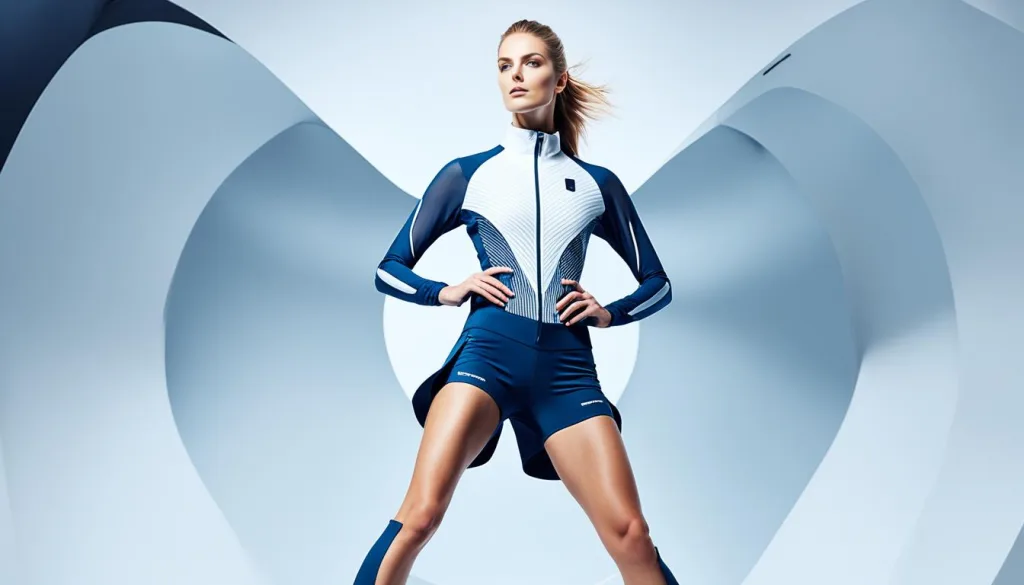
The Quest for Functionality and Aesthetics
Sportswear brands want to mix practicality with style. They are making clothes that not only perform well but look good too. These clothes use special fabrics that keep moisture away, are breathable, and can even adjust to your body’s needs. This helps athletes perform their best while looking stylish.
Material Advancements in Athletic Apparel
There’s lots of innovation happening with the fabrics used in sports clothes. The industry is focusing on eco-friendly materials that aren’t just good for the planet. They also meet the tough needs of sports and active life.
Sustainable Practices and Eco-Friendly Fabrics
Sustainability is now a must-have for sportswear brands. They’re using materials that can be recycled or break down naturally. This shift is making sports fashion both stylish and good for the Earth.
Big brands like VF Corporation see how important sustainability is. They plan to track how materials like wool and cotton are sourced and used by 20286. This effort shows how today’s buyers want brands to be open and care for the environment. It’s part of a bigger trend towards honesty and eco-friendliness in fashion.
| Brand Initiative | Material | Goal | Expected Completion |
|---|---|---|---|
| VF Corporation’s Mapping | Cotton, Wool, Leather, Rubber, Synthetics | Journey Transparency from Material to Assembly | FY2028 |
| Nespresso’s Sustainable Sourcing | Coffee Beans | Sourcing from 18 Countries With Farmer Cooperation | Ongoing with New Recycling Drop-Offs |
| Ørsted’s Clean Energy Initiatives | Wind Power | Power 1.4 Million Homes, First NY Offshore Wind Farm | Dynamic, Ongoing with GIS Technology |
Brands are telling stories that connect well with people today. They’re using crowdculture to change the game. Their new approach is about more than just the products. It’s about being a part of bigger, meaningful conversations. Conversations that matter to us all and our planet.
Power Collaborations: Athletes and Designers Reshaping Sportswear Trends
The mix of elite sports and high fashion has led to athlete-designer collaborations. These partnerships are changing sportswear trends. Athletes bring their knowledge of sports needs while top designers add their style. Together, they make clothes that are both useful and stylish. The introduction of Boost cushioning by Adidas7 and Rihanna’s work with Puma, which boosted its income by 92%8, show the big impact of these partnerships on fashion.
Since 1924, Adidas has worked well with famous athletes like Lionel Messi and Serena Williams7. They use their feedback to make products that appeal to both athletes and fashion fans. Brands focused on being green, like Adidas’ Primeblue and Primegreen lines, are liked by 44% of shoppers8.
| Collaboration Success Metrics | Adidas | Puma |
|---|---|---|
| Notable Athletic Endorsements | Lionel Messi, Serena Williams | Rihanna |
| Innovations Introduced | Boost cushioning | Fenty Puma by Rihanna line |
| Marketing Strategies | Social media & sustainability-focused | Body-positive and direct-to-consumer campaigns |
| Consumer Engagement | Sponsored sports events, community initiatives | High-impact social media tactics |
| Financial Impact | Increase in brand value | 92% net income jump in early 2017 |
These partnerships highlight how important social media is for fashion. Brands like Adidas and Puma use it to reach billions. Over 81% of people look up products there78. They provide smooth mobile experiences, like other top active wear brands. Nike focuses on online sales and building a community, changing the sportswear scene deeply8.
Athlete-designer partnerships are making sportswear trends even more exciting. They’re changing how sportswear is shown and admired at fashion shows around the world. Innovation, style, and being green come together in the best way.
Transformative Impact of Athleisure and Its Influence on Cultural Trends
The athleisure fashion trend has truly changed how we dress and see fashion around the world. It mixes casual comfort with stylish high fashion. The popularity of athleisure shows a change in social norms, extending from gyms to city life. It combines ease with style, showing the impact athleisure has on cultural trends. This blend of health, well-being, and fashion awareness creates a new movement.
Athleisure wear has grown beyond its roots, becoming a top choice for everyday wear9. It’s not just for sports anymore but for its fashion sense and flexibility. Style leaders and influencers have made this style common by wearing yoga pants and sneakers everywhere. These functional yet trendy items fit well with our active, modern lifestyles.
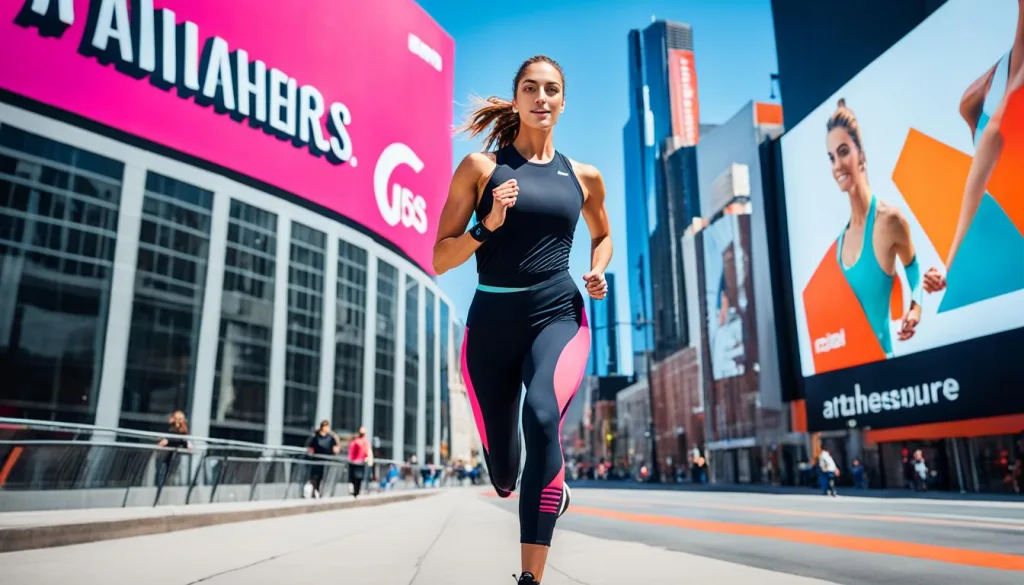
Athleisure: Casual Comfort Meets High Fashion
Athleisure wear connects casual wear with the elegance of high fashion. It creates outfits fit for sports and social events, showing athleisure’s role in changing fashion9. Designers are blending athletic materials and designs into their runway collections. This mix is redefining what we think of as stylish today.
From the Gym to the Street: The Versatility of Athleisure
Athleisure is popular not just on the streets but also in music, TV, and movies9. It has even influenced sports for people with disabilities, suggesting fashion should include everyone. Events like the Special Olympics are getting more attention, thanks to this inclusive fashion idea9.
This blend of sports and high fashion has led to advanced designs and new materials in everyday fashion9. A notable example is Adidas and Parley for the Oceans working together. They turn plastic waste into new fibers using 3D printing. This partnership shows how fashion can also care for the environment9.
The Asian market is also boosting athleisure’s popularity. China’s strong textile industry and trends like Japan’s Kawaii and South Korea’s Hallyu have made athleisure big among young, stylish people9.
| Impact Area | Examples |
|---|---|
| Cultural Integration | Music, Television, Cinema |
| Inclusive Fashion | Paralympic Games, Special Olympics |
| Environmental Initiatives | Adidas x Parley Ocean Plastic |
| Global Market Growth | China’s Textile Industry Expansion |
| Youth Influence | Kawaii in Japan, Hallyu in South Korea |
Athleisure has truly made its mark, going beyond a simple fashion trend. It symbolizes a shift to a lifestyle where comfort meets fashion in a bold way. These clothes once meant for the gym are now worn by fashion icons in the city streets. They leave a lasting impact on modern style.
How Sportswear Brands Use Fashion Shows to Showcase Innovation
Fashion and technology have come together like never before, changing how we see sportswear. The latest trends show that adding wearable technologies to sportswear in fashion shows is a big step forward. It shows the industry’s move towards more engaging and useful products.
Innovative Wearable Technologies on the Runway
Runways are now showcasing smart fabrics and clothes with augmented reality. These advanced wearable technologies in sportswear highlight the growing tech investments. By 2030, such investments are expected to hit 3.0 to 3.5 percent of revenues10. This demonstrates how tech can enhance sportswear, adding a new layer to what we wear.
Embracing Augmented Reality and AI in Fashion Presentations
AR and AI are now key in engaging customers beyond simple gimmicks. By 2024, AI will drive over half of our interactions with computers10. Fashion shows are integrating these technologies more and more. By 2030, thanks to widespread 5G, AI and AR will be everywhere in fashion.
Leveraging Social Media for Greater Fashion Show Reach
The pandemic has pushed us to spend more time online, about two and a half hours daily on social media10. Sportswear brands are using this to make their fashion shows more popular. They also use online platforms to turn viewers into buyers. This makes buying products easier after seeing them in shows.
Conclusion
Sportswear has gone beyond just performance. It now includes a mix of beauty, function, and high-tech features, often shown at fashion shows. At these events, brands showcase their newest innovations. They use advanced materials and tech like wearable technologies and augmented reality. This pushes the industry forward and matches the current trend of digital life.
The role of fashion week is becoming more crucial as we blend actual experiences with digital ones. Although the number of brands at New York Fashion Week dropped from 176 in 2018 to 70 in 202011, the industry remains strong. It quickly moved to digital presentations, especially seen in Milan’s all-digital shows in 202111. But, designers like Christian Siriano and Rebecca Minkoff still cherish live shows, proving the lasting value of in-person events11.
Success in the fashion world now means being adaptable. Take London Fashion Week, which kept many digital-only events in 202211, or New York, where 55% of shows were outdoors11. JW Anderson’s “exhibition in a box”11 showed how to keep audiences involved while being mindful of health issues. Sportswear companies are leading the way towards an innovative and digital-savvy industry.
FAQ
How do sportswear brands use fashion shows to showcase innovation?
What is the role of fashion shows in sportswear industry innovation?
How are high-tech materials incorporated into sportswear fashion shows?
How do collaborations between athletes and designers reshape sportswear trends?
What is athleisure and how does it influence cultural trends?
How do sportswear brands utilize technology in their fashion shows?
How do sportswear brands leverage social media for greater reach with their fashion shows?
Source Links
- https://www.britannica.com/art/fashion-industry
- https://www.mintel.com/insights/retail/is-digital-live-streaming-the-future-of-fashion-shows/
- https://www.theguardian.com/fashion/2024/feb/08/ai-london-fashion-week
- https://www.fibre2fashion.com/industry-article/8906/fashion-innovation-top-22-technologies-creating-the-future-of-fashion
- https://hbr.org/2016/03/branding-in-the-age-of-social-media
- https://www.nytimes.com/paidpost/esri/how-industry-leaders-are-harnessing-the-power-of-geospatial-technology.html
- https://www.brandcredential.com/post/adidas-marketing-strategy-blending-innovation-with-heritage-for-the-win
- https://www.g-co.agency/insights/activewear-athleisure-industry-index-2021-the-state-of-activewear-and-athleisure-brands-digital-performance-strategy
- https://www.bloomsburyfashioncentral.com/previously-featured-content
- https://www.mckinsey.com/industries/retail/our-insights/state-of-fashion-technology-report-2022
- https://www.glossy.co/fashion/case-study-covids-impact-on-fashion-weeks-by-the-numbers/
Latest News
How Collaboration Shapes Consumer Preferences in Sportswear
Navigating Consumer Rights and Warranties in Sportswear Sales
Artificial Intelligence in Fashion Forecasting and Trend Analysis
The Shift Towards Inclusive Sizing in Sportswear: Consumer Reactions
The Global Expansion of Luxury Sportswear Brands
From Sketch to Gym: The Design Process of Fashionable Sportswear
Understanding the Role of Trade Associations in Sportswear Compliance
How Economic Trends Influence Consumer Spending on Sportswear
Learning from Successful Global Market Entries
Best Practices for Managing Cross-Cultural Teams
Using Technology to Fight Counterfeit Fashion Products
Carbon Nanotube Fabrics for Superior Strength and Flexibility
The Growth of Fitness Tracking Apparel in Health and Wellness
Exploring the Influence of Social Proof in Sportswear Purchasing
Strategies for Managing Compliance in a Multinational Operation
Trends in Global Footwear: Performance Meets Lifestyle
The Role of Artificial Intelligence in Tracking Supply Chain Operations
Evaluating the Success of Sportswear Collaborative Projects
Evaluating the Potential of Emerging Markets
Global Shifts Towards Gender-Neutral Sportswear
Share This Article
Latest Articles


